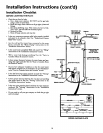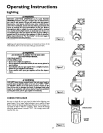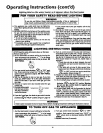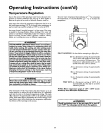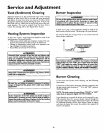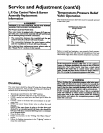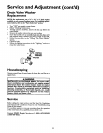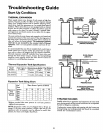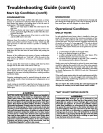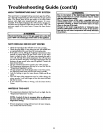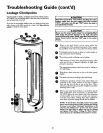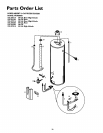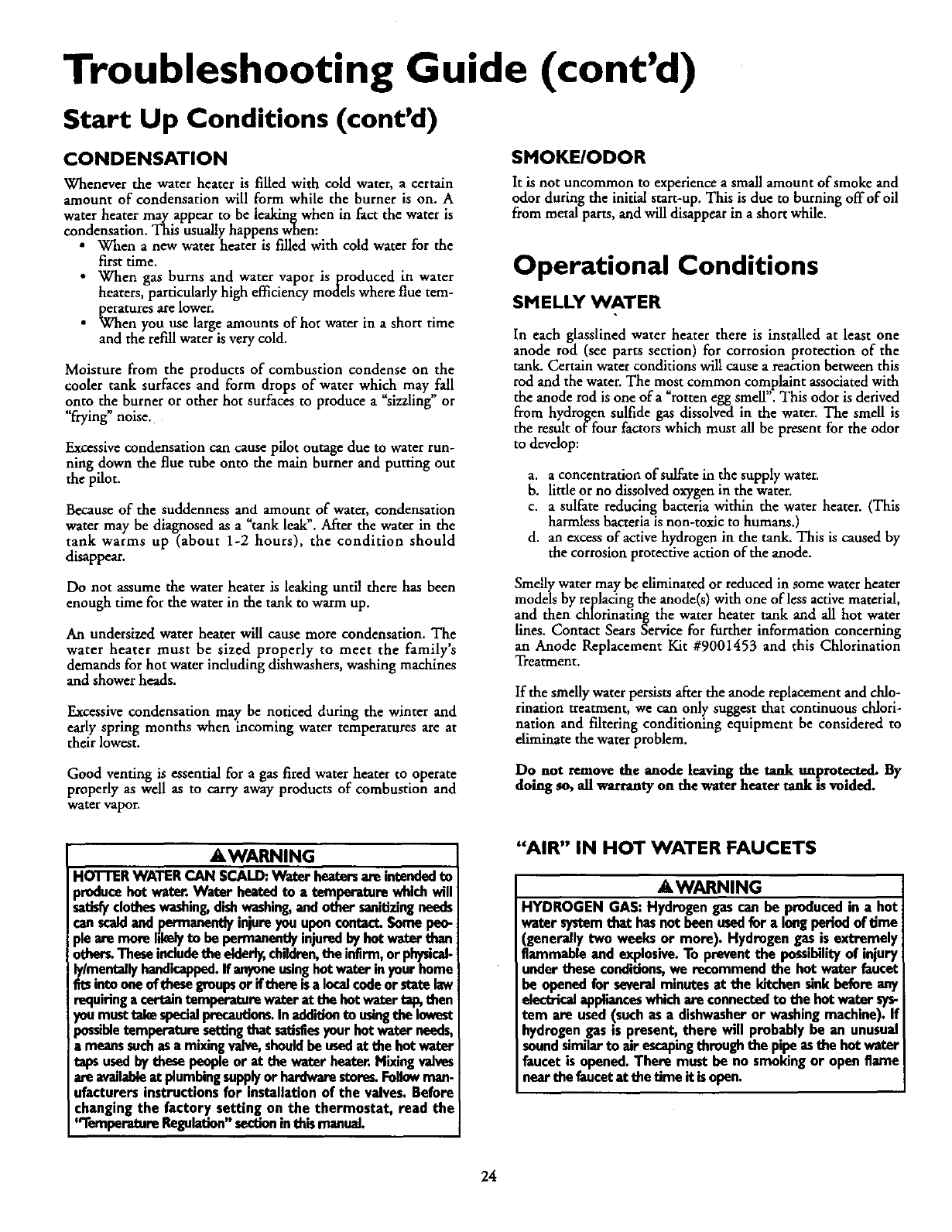
Troubleshooting Guide (cont'd)
Start Up Conditions (cont'd)
CONDENSATION
Whenever the water heater is filled with cold water, a certain
amount of condensation will form while the burner is on. A
water heater may appear to be leakingwhen in fact the water is
condensation. This usually happens when:
• When a new water heater is filled with cold water for the
first time.
• When gas burns and water vapor is produced in water
heaters, particularly high efficiency models where flue tem-
peratures are lower.
• When you use large amounts of hot water in a short time
and the refill water isvery cold.
Moisture from the products of combustion condense on the
cooler tank surfaces and form drops of water which may fall
onto the burner or other hot surfaces to produce a "sizzling" or
"frying" noise.
Excessive condensation can cause pilot outage due to water run-
ning down the flue tube onto the main burner and putting out
the pilot.
Because of the suddenness and amount of water, condensation
water may be diagnosed as a "tank leak".After the water in the
tank warms up (about 1-2 hours), the condition should
disappear.
Do not assume the water heater is leaking until there has been
enough time for the water in the tank to warm up.
An undersized water heater wi!l cause more condensation. The
water heater must be sized properly to meet the family's
demands for hot water including dishwashers, washing machines
and shower heads.
Excessive condensation may be noticed during the winter and
early spring months when incoming water temperatures are at
their lowest.
SMOKE/ODOR
It is not uncommon to experience a small amount of smoke and
odor during the initial start-up. This is due to burning off of oil
from metal parts, andwill disappear in ashort while.
Operational Conditions
SMELLY WATER
In each glasslined water heater there is installed at least one
anode rod (see parts section) for corrosion protection of the
tank. Certain water conditions will cause a reaction between this
rod and the water. The most common complaint associated with
the anode rod is one of a rotten egg smell '. This odor is derived
from hydrogen sulfide gas dissolved in the water. The smell is
the result of four factors which must all be present for the odor
to develop:
a. a concentration of sulfate in the supply water.
b. little or no dissolved oxygen in the water.
c. a sulfate reducing bacteria within the water heater. (This
harmless bacteria is non-toxic to humans.)
d. an excess of active hydrogen in the tank. This is caused by
the corrosion protective action of the anode.
Smelly water may be eliminated or reducedin some water heater
models by replacing the anode(s) with one of less acdvematerial,
and then chlorinating the water heater tank and all hot water
lines. Contact Sears Service for further information concerning
an Anode Replacement Kit #9001453 and this Chlorination
Treatment.
If the smelly water persists afterthe anode replacement and chlo-
rination treatment, we can only suggest that continuous chlori-
nation and filtering conditioning equipment be considered to
eliminate the water problem.
Good vendng is essential for a gas fired water heater to operate
properly as well as to carry away products of combustion and
watervapor.
Do not remove the anode leaving the tank unprotected. By
doing so, all warx_ty on the water heater tank is voided.
AWARNING
HOTTERWATERCAN SCALD:,Water heatersare intendedto
ptisfyrOducehotwater.Water heatedto a temperaturewhichwill
clotheswashing,dishwashing,andothersanitizingneeds
canscaldand permanentlyinjureyouuponcontact.Somepeo-
plearemoreflkelyto bepermanentlyinjuredbyhotwater than
uthe_ Theseindudethe elderly,children,theinfirm,or physical-
ly/mentanyhandicapped.Ifanyoneusinghotwaterinyourhome
fitsintooneofthesegruupsor ifthereisa localcodeor statelaw
requiringacertaintemperature wateratthehotwatertap,then
youmusttakespeciziprecaudon_In additionto usingthelowest
possibletemperature settingthatsatisfiesyour hotwater needs,
a meanssuchasa mixingvalve,shouldbe usedat the hotwater
tapsusedbythesepeopleor at the waterheater Mixingvalves
are availableat plumbingsupplyorhardwarestores.Followman.
ufacturersinstructionsfor installationof the valves.Before
changingthe factory setting on the thermostat, read the
'eremperatureRegulation"sectioninth_ manual.
"AIR" IN HOT WATER FAUCETS
A WARNING
HYDROGEN GAS: Hydrogengascanbe producedin a hot
water systemthat hasnot beenusedfor a longperiod oftime
(generallytwo weeksor more). Hydrogengas!,s.extremely
flammableand explosive.To preventthe possibil|tyof injury
underthese conditions,we recommendthe hot water faucet
be openedfor severalminutesat the ldtchen sinkbeforeany
electricalapplianceswhichareconnectedto the hotw_er sys-
tem are used(suchasa dishwasheror washingmachine).If
hydrogengasis present,there will probablybe an unusual
soundsimilarto air escapingthrough the pipeasthe hotwater
faucetis opened.There mustbe no smokingor openflame
nearthe faucetat the time itisopen.
24



